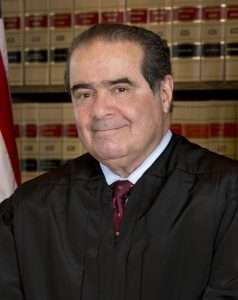The Volokh Conspiracy
Mostly law professors | Sometimes contrarian | Often libertarian | Always independent
Today in Supreme Court History: February 13, 2016
2/13/16: Justice Antonin Scalia died.

Editor's Note: We invite comments and request that they be civil and on-topic. We do not moderate or assume any responsibility for comments, which are owned by the readers who post them. Comments do not represent the views of Reason.com or Reason Foundation. We reserve the right to delete any comment for any reason at any time. Comments may only be edited within 5 minutes of posting. Report abuses.
Please to post comments


Strawbridge v. Curtiss, 7 U.S. 267 (decided February 13, 1806): Out of this evil seed grew upwards of two hundred years of ridiculously wasteful procedural litigation. Marshall holds that "between a citizen of a state and a citizen of another state", under the Judiciary Act of 1789, means that in a diversity action every plaintiff must be from a different state from every defendant. The Constitution itself says only "between citizens of different states", art. III, §2, and there's nothing to stop Congress from undoing this decision by statute. The Court itself has noted that all Article III really requires is "minimal" diversity (just one plaintiff has to be from a different state from just one defendant); see 545 U.S. 546. A bill to totally abolish diversity jurisdiction passed the House of Representatives resoundingly in 1978 but failed in the Senate, defeated by the lawyers' lobby. (Marshall later regretted this holding, see discussion at 43 U.S. 497, 555.)
Phillips v. Mound City Land & Water Ass'n, 124 U.S. 605 (decided February 13, 1888): no federal question presented by state court's partitioning of land in Los Angeles according to its construction of laws of Mexico as they existed pre-conquest (conquest by the United States, that is)
United States v. Jung Ah Lung, 124 U.S. 621 (decided February 13, 1888): Chinese national in custody after not being allowed to land in San Francisco due to Chinese Exclusion Act of 1882 was permitted to bring habeas petition (habeas statute was then changed in 1891 to disallow immigrant petitions, see Dept. of Homeland Security v. Thuraissigiam, 2020)
Miller v. Pate, 386 U.S. 1 (decided February 13, 1967): defendant convicted of rape/murder of eight-year-old girl based on his "bloody underpants" presented at trial but prosecutor knew it was just red paint; habeas granted and conviction vacated
Interstate Circuit v. United States, 306 U.S. 208 (decided February 13, 1939): This is one of many cases on whether motion picture distribution agreements violate antitrust laws. I mention it here because of the wonderful sentence: "The production of weak evidence when strong is available can lead only to the conclusion that the strong would have been adverse." Id. at 226. In my practice I never have to look at SCOTUS cases, but I quote this every chance I get.
Congress relaxed the diversity requirement in the Class Action Fairness Act.
True. It's simply not realistic to expect a class action ever to have complete diversity.
Also with interpleader. I once brought an interpleader in federal court, even though some of the "defendants" (i.e., claimants) had the same domicile as my clients (the insurers), because all that's needed in interpleader is minimal diversity.
Regarding Miller v. Pate, the Illinois Supreme Court decision on direct appeal is at https://casetext.com/case/the-people-v-miller-9
There is a discussion of pre-Miranda law on admission of confessions. "The People interpret the record as showing a completely voluntary confession obtained after an orderly process of questioning and investigation by officers of experience and integrity. Defendant, on the other hand, denies he knowingly signed a confession at all and construes the evidence as showing his signature on the document in evidence resulted through fear induced by threats of the electric chair and an aura of violence and hostility surrounding his interrogation." As a question of fact, the trial judge's finding on this issue will ordinarily be upheld. (In Massachusetts once the judge concludes a confession was voluntary the jury is instructed that jurors must unanimously agree that it was voluntary if it is to be considered as evidence, the so-called "humane practice" instruction.)
The Interestate Circuit standard is actually written into the jury instructions in California.
https://www.justia.com/trials-litigation/docs/caci/200/203/
Thanks. Similar to a "missing witness" charge.
Miller v Pate is extraordinary even by the standards of the American justice system. I haven't been able to find out on a quick search what happened to the prosecutor, but I suspect she did not suffer too much adversity, when clearly she deserved everything that Lloyd Miller went through, and more.
https://content.time.com/time/subscriber/article/0,33009,899431,00.html
Thanks for the link.
The story calls the prosecutor “he”. Maybe the first name is not Elaine (or Ramsey, for that matter). Sometimes these old news articles get garbled.
What's also remarkable is that the Court of Appeals let the conviction stand.
The people were represented on direct appeal by Latham Castle, Blaine Ramsey, Fred G. Leach, and Roger W. Hayes.
So Blaine, not Elaine. Thanks! As a result I was able to find these stories:
https://content.time.com/time/subscriber/article/0,33009,941098,00.html
https://content.time.com/time/subscriber/article/0,33009,941615,00.html
The Bar protects one of its own.
Good grief!!
What’s also remarkable is that the Court of Appeals let the conviction stand.
I always wonder, in such cases, when an appellate court must surely see that things were seriously wrong, whether the prosecutor unofficially informs one or more of the appellate judges that they're sure the guy is guilty, but they admit that they haven't the evidence they wish they could present. Nods and winks all around.
Scalia Died, and Merrick Garland still isn't on the Court
God bless Mitch McConnell!